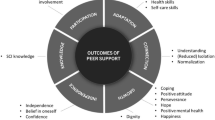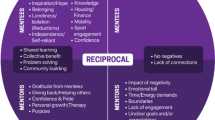Abstract
Study design:
Qualitative study involving individual semistructured in-depth interviews.
Objectives:
To evaluate peer support provided in general hospitals for people with spinal cord injuries (SCIs).
Setting:
The South West of the United Kingdom.
Methods:
Fourteen in-depth qualitative interviews were conducted with people with SCI and their close relatives, and with health-care professionals involved in their care. Transcribed interviews were coded inductively and analysed thematically. Themes were patterned around positive and less positive aspects of the experience of the peer support service.
Results:
The psychological and emotional support provided by the peer support officer was highly valued by the participants. The peer support officer’s direct experience of living with a spinal injury gave credibility to the practical advice, information and signposting provided; as well as to the empathy demonstrated by them during their involvement with people with SCI and their families. Health-care professionals appreciated their unique perspective and considered them as a valuable member of the multidisciplinary team.
Conclusion:
Peer support is valued by the people affected by SCI. There is a need to further investigate the key aspects of the service, including the optimal timing for introducing this peer support as well as more formal training of mentors.
Similar content being viewed by others
Log in or create a free account to read this content
Gain free access to this article, as well as selected content from this journal and more on nature.com
or
References
Patterson RW, Bushnik T, Burdsall D, Wright J . Considerations of peer support for persons with high tetraplegia. Top Spinal Cord Inj Rehabil 2005; 10: 30–37.
Dennis C-L . Peer support within a health care context: a concept analysis. Int J Nurs Stud 2003; 40: 321–332.
Standal ØF, Jespersen E . Peers as resources for learning: a situated learning approach to adapted physical activity in rehabilitation. Adapt Phys Activ Q 2008; 25: 208–227.
Boschen KA, Tonack M, Gargaro J . Long-term adjustment and community reintegration following spinal cord injury. Int J Rehab Res 2003; 26: 157–164.
Jalovcic D, Pentland W . Accessing peers’ and health care experts’ wisdom: a telephone peer support program for women with SCI living in rural and remote areas. Top Spinal Cord Inj Rehabil 2009; 15: 59–74.
Hibbard MR, Cantor J, Charatz H, Rosenthal R, Ashman T, Gundersen N et al Peer support in the community: initial findings of a mentoring programme for individuals with traumatic brain injury and their families. J Head Trauma Rehabil 2002; 17: 112–131.
Hanks RA, Rapport LJ, Wertheimer J, Koviak C . Randomized controlled trial of peer mentoring for individuals with traumatic brain injury and their significant others. Arch Phys Med Rehabil 2012; 93: 1297–1304.
Funck-Brentano I, Dalban C, Veber F, Quartier P, Hefez S, Costagliola D et al Evaluation of a peer support group therapy for HIV-infected adolescents. AIDS 2005; 19: 1501–1508.
Hoey LM, Sutherland G, Williams PA, White V . Comparing the needs of health professional and peer cancer support group facilitators in an Australian context. Eur J Cancer Care (Engl) 2011; 20: 87–92.
Giesbers J, Verdonck-de Leeuw IM, van Zuuren FJ, Kleverlaan N, van der Linden MH . Coping with parental cancer: web-based peer support in children. Psychooncology 2010; 19: 887–892.
Ieropoli SC, White VM, Jefford M, Akkerman D . What models of peer support do people with colorectal cancer prefer? Eur J Cancer Care (Engl) 2011; 20: 455–465.
Hughes J, Wood E, Smith G . Exploring kidney patients’ experiences of receiving individual peer support. Health Expect 2009; 12: 396–406.
Badger K, Royse D . Adult burn survivors’ views of peer support: a qualitative study. Soc Work Health Care 2010; 49: 299–313.
Veith EM, Sherman JE, Pellino TA, Yasui NY . Qualitative analysis of the peer-mentoring relationship among individuals with spinal cord injury. Rehabil Psychol 2006; 51: 289–298.
Percy CA, Gibbs T, Potter L, Boardman S . Nurse-led peer support group: experiences of women with polycystic ovary syndrome. J Adv Nurs 2009; 65: 2046–2055.
Colella TJF, King KM . Peer support. An under-recognized resource in cardiac recovery. Eur J Cardiovasc Nurs 2004; 3: 211–217.
Alvarez K, van Leeuwen E . To teach or to tell? Consequences of receiving help from experts and peers. Eur J Soc Psychol 2011; 41: 397–402.
Ljungberg I, Kroll T, Libin A, Gordon S . Using peer mentoring for people with spinal cord injury to enhance self-efficacy beliefs and prevent medical complications. J Clin Nurs 2011; 20: 351–358.
Shem K, Medel R, Wright J, Kolakowsky-Hayner SA, Duong T . Return to work and school: a model mentoring program for youth and young adults with spinal cord injury. Spinal Cord 2011; 49: 544–548.
Veith EM, Sherman JE, Pellino TA . Qualitative analysis of the peer-mentoring relationship among individuals with spinal cord injury. Rehabil Psychol 2006; 51: 289–298.
Magasi S, Papadimitriou C, Rosen L, Cichowski K . Poster 82: peer mentoring outcomes and processes in in-patient rehabilitation: a mixed-methods study integrating multiple stakeholder perspectives. Arch Phys Med Rehabil 2009; 90: e37.
Consortium for Spinal Cord Medicine. Early acute management in adults with spinal cord injury: a clinical practice guideline for health-care professionals. J Spinal Cord Med 2008; 31: 408–479.
MacNeil C . A narrative approach to developing standards for trauma-informed peer support. Am J Eval 2005; 26: 231–244.
Thoits PA, Hohmann AA, Harvey MR, Fletcher B . Similar-other support for men undergoing coronary artery bypass surgery. Health Psychol 2000; 19: 264–273.
Acknowledgements
We would like to thank the Spinal Injuries Association (SIA) United Kingdom for their valuable input and support. In particular, we would like to acknowledge the input of Anne Curran, Peter Hutchings and Debbie Schofield. We would also like to thank all those who gave their time freely and generously during the interviews and chat-room discussions. This study was supported through a Plymouth University Vice Chancellors Community Research Award.
Author information
Authors and Affiliations
Corresponding author
Ethics declarations
Competing interests
The authors declare no conflict of interest.
Rights and permissions
About this article
Cite this article
Haas, B., Price, L. & Freeman, J. Qualitative evaluation of a Community Peer Support Service for people with spinal cord injury. Spinal Cord 51, 295–299 (2013). https://doi.org/10.1038/sc.2012.143
Received:
Revised:
Accepted:
Published:
Issue date:
DOI: https://doi.org/10.1038/sc.2012.143
Keywords
This article is cited by
-
Outcomes of peer mentorship for people living with spinal cord injury: perspectives from members of Canadian community-based SCI organizations
Spinal Cord (2021)
-
Understanding peer mentorship programs delivered by Canadian SCI community-based organizations: perspectives on mentors and organizational considerations
Spinal Cord (2021)
-
Experiences of peer counselling during inpatient rehabilitation of patients with spinal cord injuries
Spinal Cord Series and Cases (2019)
-
A scoping review of peer-led interventions following spinal cord injury
Spinal Cord (2019)
-
Implementing volunteer peer mentoring as a supplement to professional efforts in primary rehabilitation of persons with spinal cord injury
Spinal Cord (2019)



